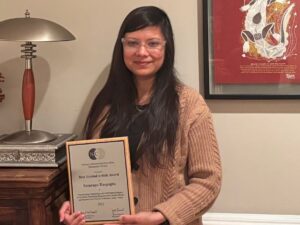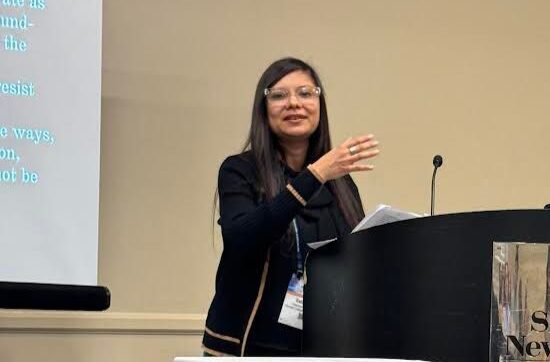- About Ramapo
- Academics
- Admissions & Aid
- Student Life
- Athletics
- Alumni
- Arts & Community
- Quick Links
- Apply
- Visit
- Give
Health Communication Professor Awarded by National Communication Association

Dr. Satarupa Dasgupta continues to bring awareness to marginalized communities in sex work through her research, earning best journal article by NCA
February 10, 2025
by Liz Mendicino ’26
Throughout her career as a health communications professional and professor, Dr. Satarupa Dasgupta, associate professor of applied communication in the School of Contemporary Arts, has conducted extensive research into various crucial stigmatized topics. Dasgupta regularly challenges the societal norm through researching intimate partner violence, sex work, and neurodivergence.
Most recently Dasgupta was awarded the Best Journal Article Award from the National Communication Association Ethnography Division for her paper, “Experiencing, Negotiating and Challenging Stigma in Sex Work: Examining Responses from Brothel-Based and Transient Sex Workers in Kolkata, India.” The article was published in the journal Sexes in 2023.
Dasgupta conducted her research on transient and stationary sex workers in India partially through funding from Faculty Development Funding (FDF) at Ramapo College. The study delineates the impact of stigmatization on brothel-based and transient sex workers in India and explores how these two groups negotiate with and resist stigma in their lives. The study results showed that the impact and extent of stigmatization remained associated with the sex workers’ location and gender identification. Transient transgender sex workers are outliers within their constituent marginalized groups of sex workers, and are consigned to a position of acute social invisibility and silence.
 “Sex workers are a high risk, marginalized community, and there is not a lot of understanding,” said Dasgupta. “We do not have enough research on it nor discourse on what they themselves think, we don’t highlight their own voices. Highlighting the voices of sex workers and sex work as a career, contrary to the public policy understanding being rescue and rehab.”
“Sex workers are a high risk, marginalized community, and there is not a lot of understanding,” said Dasgupta. “We do not have enough research on it nor discourse on what they themselves think, we don’t highlight their own voices. Highlighting the voices of sex workers and sex work as a career, contrary to the public policy understanding being rescue and rehab.”
For Dasgupta, the greatest reward of her work is decreasing the stigma surrounding the marginalized communities she researches. “Stigma works in a lot of ways, and a lot of it can be invisible,” said Dasgupta. “It is also important to talk about intersectional multiple subordinate identities intersectional invisibility hyper-marginalized I work with sex workers different from the typical sex worker, way more at risk, a lot of preconceived notions, think about the different layers that you are it is part of life and a part of learning, we are not a monolith.”
There is a critical need for the data Dasgupta collects, and for the stories she tells to be heard. Her research allows for the destigmatization of truly marginalized groups, which then allows for comprehensive help that truly tends to the populations’ needs. To learn more about her work, visit her profile.
Copyright ©2025 Ramapo College Of New Jersey. Statements And Policies. Contact Webmaster.

Follow Ramapo